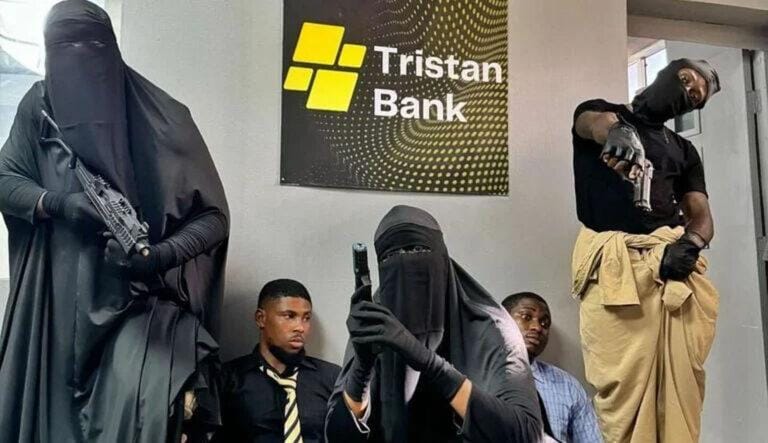Nollywood actress Nancy Isime has received received condemnation from the Muslim community in Nigeria after unveiling a movie poster that features women wearing hijab and face veils holding guns in a bank robbery scene.
The Muslims have threatened to file a complaint with Meta, the parent company of Facebook and Instagram, to demand action against the account responsible for sharing what they described as “Islamophobic content.”
Reacting, one Latifat Adewunmi Jumah, with a Facebook page named Laj Fingers, expressed her dissatisfaction over the offensive posts, saying, “The niqab is not an armed robbery attire! The niqab/hijab is not an attire for concealing identity.
She queried the actress, saying, “If you needed to conceal your identity for a perfect robbery role, you could have used a nose mask or worn a mask. Why wear Islamic attire?”
“I find this offensive. Something needs to be done to stop these people. Niqab/Hijab is not a costume, nor is it a joke,” she added.
Speaking on the movie, Bashir Ahmed, former Digital Communications Assistant to ex-President Muhammadu Buhari, in a statement on X on Thursday, mentioned that the niqab “should not be used as a mere costume in a movie, especially when the scenes it portrays are clearly associated with negative moral vices.”
Ahmed’s statement read, “I join my brothers and sisters to strongly protest the use of the hijab (Niqab) in an upcoming Nigerian movie produced by one Ms. Bolanle Ayo.
“The hijab is an outfit deeply attributed to Muslim women that symbolises respect, modesty, and religious devotion. And I believe it should not be used as a mere costume in a movie, especially when the scenes it portrays are clearly associated with negative moral vices.
“Using the hijab in such scenes is a profound disrespect to our mothers, sisters, and daughters. This garment is a symbol of respect, and portraying it in a manner that suggests otherwise is offensive to those who wear it for religious purposes.
“The producers of this movie should have considered alternative costumes, such as balaclavas or masks, for such scenes. For us, the hijab (Niqab) is not worn by our women to hide their identity to commit crimes but to respect, follow, and abide by the teachings of our religion.
“I join well-meaning Nigerians in calling on the producers of this movie to respect our religion and remove all the scenes where the hijab is portrayed negatively. We also urge the National Film and Video Censors Board to censor these hurtful scenes to protect the dignity of those who wear the hijab.”
In his reaction, Taiwo James said, “This was exactly what I was saying days ago. We need to respect people’s culture and religion. No matter what. Hijab is highly respected in Islam for my Muslim brothers, and we need to respect it.”
Bashir Ismail argued that the use of the hijab in such a manner would create a “negative stereotype.”
“Hijab is a sacred symbol of faith, modesty, and respect for Muslim women, and it’s disheartening to see it being used as a prop to perpetuate negative stereotypes. I stand in solidarity with the Muslim community in calling for the removal of these offensive scenes and urgin,” Ismail argues.
“Yes, I concur to the fact that hijab is a modest wear that shouldn’t in anyway be trampled upon because of its level of importance. “This video should be abolished and restricted for production,” Bagbansoro AbdulAzeez, another X user, stated.












